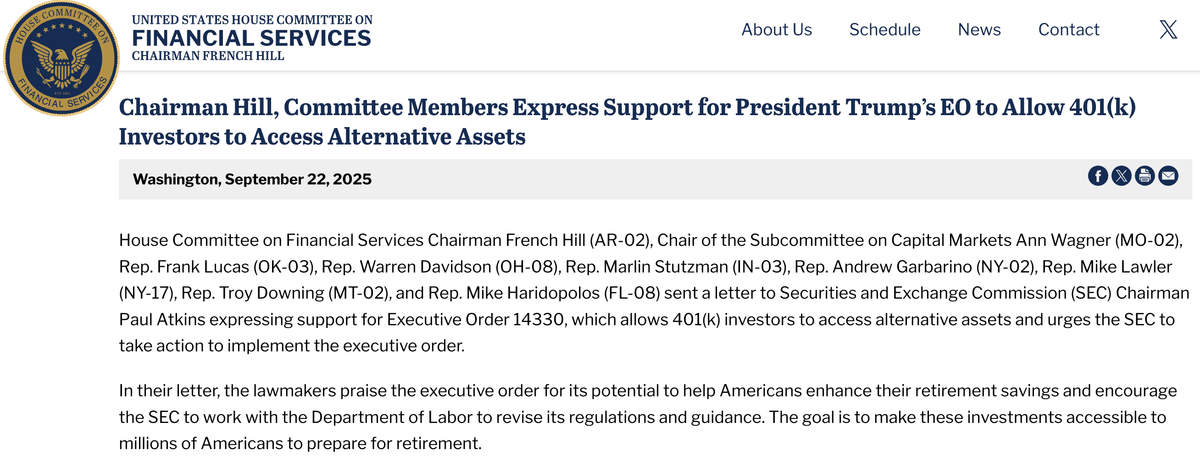
SEC urged to expand crypto access in 401(k)
A group of nine members of the House Financial Services Committee has urged the U.S. Securities and Exchange Commission (SEC) to quickly implement President Donald Trump’s August 7 executive order, which could allow Americans to invest in cryptocurrencies through their 401(k) retirement plans.
The coalition, led by Chairman French Hill and Capital Markets Subcommittee Chair Ann Wagner, emphasized that the initiative could democratize access to alternative assets previously reserved for wealthy investors. In a letter to SEC Chairman Paul Atkins, the lawmakers called for close coordination with the Department of Labor (DOL) to update rules for participant-directed contribution plans. If enacted, this change could impact more than 90 million Americans saving for retirement.

The letter stated: “Every American preparing for retirement should have access to funds that include alternative assets when deemed appropriate by fund managers.”
Separately, lawmakers highlighted ongoing bipartisan legislation in the 119th Congress aimed at modernizing the definition of an “accredited investor”, a longstanding barrier preventing average Americans from accessing private markets and digital assets. Though distinct from the 401(k) initiative, it reflects the broader momentum toward expanding investment opportunities.
How 401(k) Allocations Could Impact Crypto
Analysts estimate that even small allocations to crypto within 401(k) plans could generate substantial inflows. For example, a 0.1% default allocation applied to just 10% of plans would represent over $1 billion in exposure to cryptocurrencies. Broader adoption scenarios could scale into tens of billions of dollars.
The inherent stickiness of 401(k) investments amplifies this impact. Vanguard’s 2025 report shows that 84% of participants rely on target-date funds, up from 46% in 2015, while only 1% made any trades in 2024. This suggests that default allocations — including potential crypto exposure — heavily shape long-term investor behavior.
If the SEC acts promptly, the executive order could redefine retirement planning in the U.S., enabling savers to align portfolios with emerging asset classes like blockchain and cryptocurrencies. Next steps include SEC guidance, regulatory revisions, and product filings before plan sponsors can update investment menus.
Still, market observers caution that meaningful changes may not occur immediately. Some forecasts indicate that significant adjustments may not materialize until 2026 or later.
Disclaimer: The content above reflects the author’s personal views and does not represent any official position of Cobic News. The information provided is for informational purposes only and should not be considered as investment advice from Cobic News.